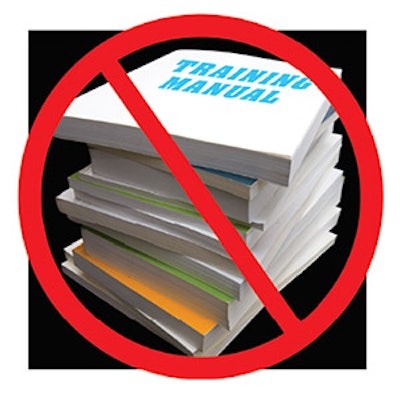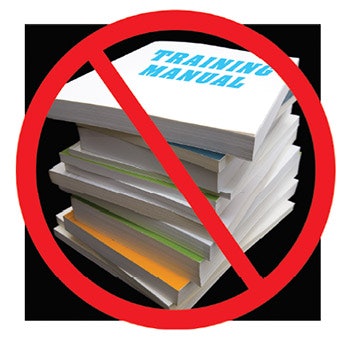

"All things are not created equal." We've all heard the phrase, right? Well, when it comes to hiring new service technicians, all things are definitely not created equal.
See, most pool companies train new hires in the same way every time. But think of the chain pool and spa stores that have locations all over the country. People in Florida, for example, should not be trained the same way as someone in Pennsylvania. Why is that? It's simple: Technicians from different areas deal with different things. A technician in Florida, for example, does not have to deal with opening or closing a pool like a technician in Pennsylvania does.
With that said, what type of training process does work?
Here, I break it down into phases to help you develop a strong, well-rounded employee.
1. EXPLORE THEIR PURPOSE
In all reality, your new hire should have a good idea of what their purpose is in their new role: to maintain pools. However, it's also important for your staff to know why they are important and valuable to you. You want to lay the foundation that they are a key player in your success.
This phase is also where you want to set expectations and explain what can happen if they don't do their job. Ask them things like, "Do you know what will happen if you don't add chemicals during your visit?" "How about if you don't clean the filter or empty the baskets?" By doing this, you're letting them know how they are valuable to you and how they stay valuable to you.
2. ACCESS POOL APTITUDE
Remember the placement tests you took in grade school to see where you're at academically? We need to bring that concept to the pool and spa industry.
Remember: Companies are only as strong as its weakest link. So why would we want to send a new hire out into something they aren't fluent in? That's where this "placement test," of sorts, will come in handy.
RELATED: Tips for Hiring and Training Service Techs
Create a quiz to the length of your choosing with a mixture of basic and intermediate questions. The final score will reveal where your new hire is strong and weak. This valuable insight will help you shape your next steps: Should you take them to a pool and see how they perform in a real-world setting? Should you send them a CPO class to give them a head start? Do you have them shadow you or another well-trained employee? All of these questions can help point your employee toward the path of success.
3. ON THE JOB TRAINING (OJT)
This is the part that really prepares your new hire for what they are going to be doing on their own. When a new hire is doing OJT, pair him/her with one of your experienced technicians, but do so strategically and use the placement test to help.
For example, if your new hire doesn't know a lot about filters, you may want to pair them with a tech who is doing several filter cleanings that week. If they don't know much about the dynamics of installing equipment, maybe send them out with one of your repair guy/gals so they can see how the pieces of equipment come together.
This step is important because it helps your new hires improve their weak points, which makes them more capable of troubleshooting on their own, which makes for a more efficient route.
(This will also limit the phone calls you receive each day from them asking for your help. Trust me, I know from experience.)
4. CLIENT ENGAGEMENT
The way your clients perceive your employees will, more likely than not, dictate whether they keep you as their service company, because your employees are a reflection of you. So lay the ground rules and train them on the etiquette you expect them to follow when on your clients' property. Are they playing loud music while servicing a pool? Are they personable and friendly to the clients? Do they make sure hoses are turned off and gates are closed before leaving the job site? Lay out each specific detail during the training process.
RELATED: The Building Blocks of Training
Also train your new hires on the basic questions they'll commonly receive while on the route. Because after all, if your new hire can't answer the most basic question about the pool they're working on, how does that make you look?
5. CLIENT FOLLOW-UP
Clients genuinely appreciate it when you or your employees follow up with them; it cultivates goodwill that solidifies your relationship with them. So train your employees to be on the hunt for follow-up opportunities. Are they bringing items to the homeowners' attention before they are even aware? Do the clients understand the information that your employees are putting on the door hanger? Do your employees ask the clients if they have any questions about their pool?
These are all very important things to ensure your client's satisfaction. Encourage your team members to be one step ahead of your clients. This will make your company look like all-stars.
As you can see, it takes more than a classroom session to fully train new employees. Training really is a process that takes time. But if you can get your new employees trained in the above areas, you're well on your way to success.
Erik Taylor is the owner of Chlorine King Pool Services, Seminole, Fla. Go online to check out his successful and entertaining YouTube channel and podcast.












































